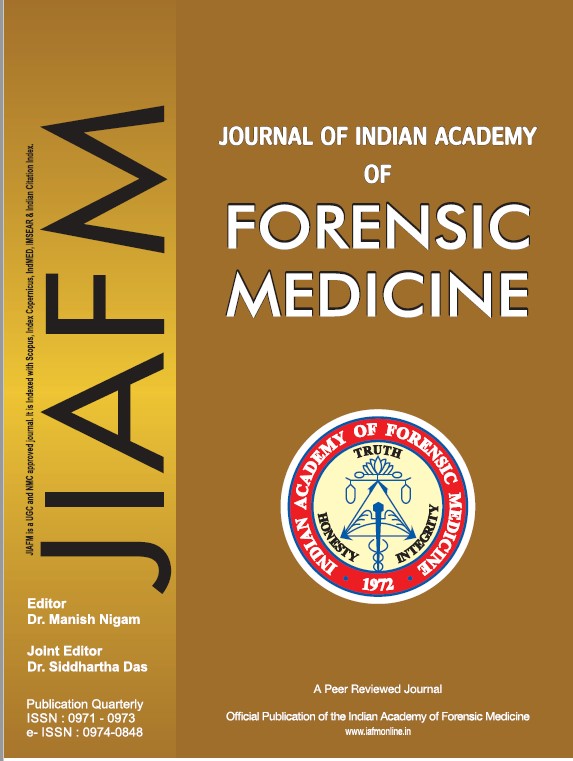Determination of Sexual Dimorphism from Foramen Magnum in an Eastern Indian Population
DOI:
https://doi.org/10.48165/jiafm.2024.46.1.14Keywords:
Forensic science, Forensic anthropology, Sex characteristics, Discriminant analysis, Foramen magnumAbstract
Human identification is an important arena of forensic investigation, it includes sex determination which becomes extremely difficult in fragmented skeletal remains. Skull dimensions are measured for the purpose of sexual dimorphism which vary in different populations. In this study, we attempted to analyse the measurements from adult human skulls and employ discriminant function to predict sex accurately. A manual vernier calliper was used to measure the antero-posterior (AP) diameter and transverse diameter of foramen magnum of 88 skulls (49 males, 39 females) from the collection housed at the department of Anatomy, RG KAR medical college and Calcutta medical college. The Wilk's lambda for the model is 0.795. The discriminant function equation is, Df= 3.342× (APdiameter of foramen magnum) +0.725× (Transverse diameter of foramen magnum) -13.641(constant). The cut-off point is 0.505. So above this value 0.505, the cases are male and below it, the cases are female. On comparing the measurements, we found that antero-posterior dimensions and transverse dimensions of foramen magnum were greater in males than females. Collectively, all the results indicate that dimensions of foramen magnum can be used as a moderate indicator for sex determination in regional populations.
Downloads
References
Reddy KN, Murty OP. The essentials of forensic medicine and toxicology. New Delhi, India: Jaypee Brothers Medical Publishers; 2022:41.
Lain R, Taylor J, Croker S, Craig P, Graham J. Comparative dental anatomy in disaster victim identification: lessons from the 2009 Victorian Bushfires. Forensic science international. 2011 Feb 25;205(1-3):36-9.
González-Colmenares G, Medina CS, Rojas-Sánchez MP, León K, Malpud A. Sex estimation from skull base radiographs in a contemporary Colombian population. Journal of forensic and legal medicine. 2019 Feb 1;62:77-81.
Uthman AT, Al-Rawi NH, Al-Timimi JF. Evaluation of foramen magnum in gender determination using helical CT scanning. Dentomaxillofacial Radiology. 2012 Mar;41 (3):197-202.
Standring S, Gray H. Gray's anatomy: the anatomical basis of clinical prac.tice.. 40th edition.London.Elsevier2022.pg-406.
Murshed KA, Çiçekcibaşi AE, Tuncer I. Morphometric evaluation of the foramen magnum and variations in its shape: a study on computerized tomographic images of normal adults. Turkish Journal of Medical Sciences. 2003;33(5):301-
Radinsky L. Relative brain size: a new measure. Science. 1967 Feb 17;155(3764):836-8.
Kamath VG, Asif M, Shetty R, Avadhani R. Binary logistic regression analysis of foramen magnum dimensions for sex determination. Anatomy research international. 2015;2015. http://dx.doi.org/10.1155/2015/459428
Jaitley M, Phulambrikar T, Kode M, Gupta A, Singh SK. Foramen magnum as a tool for sexual dimorphism: A cone beam computed tomography study. Indian Journal of Dental Research. 2016 Sep 1;27(5):458.
Abo El-Atta HM, Abdel-Rahman RH, El-Hawary G, Abo El 62
Al-Atta HM. Sexual dimorphism of foramen magnum: An Egyptian study. Egyptian Journal of Forensic Sciences. 2020 Dec;10(1):1-2.
Tellioglu AM, Durum Y, Gok M, Karakas S, Polat AG, Karaman CZ. Suitability of foramen magnum measurements in sex determination and their clinical significance. Folia Morphologica. 2018;77(1):99-104.
Chovalopoulou ME, Bertsatos A. Estimating sex of modern Greeks based on the foramen magnum region. Journal of Anthropology. 2017;2017.http://dx.doi.org/10.1155 /2015/459428
Atreya A, Shrestha R, Bhandari K, Malla SK, Acharya S, Menezes RG. Morphometric analysis of the foramen magnum in sex estimation: An additional 3DCT study from Nepal on a larger sample. Health Science Reports. 2023 Jan;6(1):e999.
Biswas S, Chowdhuri S, Das A, Mukhopadhyay PP. Observations on symmetry and sexual dimorphism from morphometrics of foramen magnum and orbits in adult Bengali population. Journal Of Indian Academy of Forensic Medicine. 2015;37(4):346-51.


